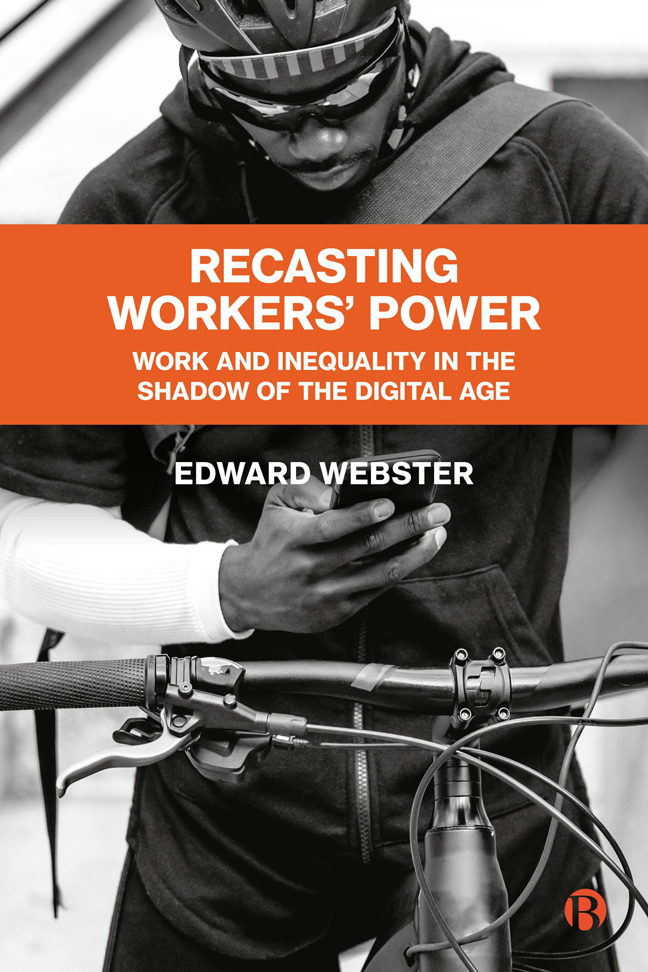Book contents
- Frontmatter
- Contents
- List of Figures and Tables
- List of Abbreviations
- Preface
- 1 The End of Labour? Rethinking the Labour Question in the Digital Age
- 2 Precarious Work after Apartheid: Experimenting with Alternative Forms of Representation in the Informal Sector
- 3 Neo-liberalism Comes to Johannesburg: Changing the Rules of the Game
- 4 Divided Workers, Divided Struggles: Entrenching Dualisation and the Struggle for Equalisation in South Africa's Manufacturing Sector
- 5 Authoritarian Algorithmic Management: The Double-edged Sword of the Gig Economies
- 6 Crossing the Divide: Informal Workers and Trade Unions
- 7 Global Capital, Global Labour: The Possibilities of Transnational Activism
- 8 Changing Sources of Power and the Future of Southern Labour
- Index
8 - Changing Sources of Power and the Future of Southern Labour
Published online by Cambridge University Press: 23 January 2024
- Frontmatter
- Contents
- List of Figures and Tables
- List of Abbreviations
- Preface
- 1 The End of Labour? Rethinking the Labour Question in the Digital Age
- 2 Precarious Work after Apartheid: Experimenting with Alternative Forms of Representation in the Informal Sector
- 3 Neo-liberalism Comes to Johannesburg: Changing the Rules of the Game
- 4 Divided Workers, Divided Struggles: Entrenching Dualisation and the Struggle for Equalisation in South Africa's Manufacturing Sector
- 5 Authoritarian Algorithmic Management: The Double-edged Sword of the Gig Economies
- 6 Crossing the Divide: Informal Workers and Trade Unions
- 7 Global Capital, Global Labour: The Possibilities of Transnational Activism
- 8 Changing Sources of Power and the Future of Southern Labour
- Index
Summary
In the early 1970s the apartheid state seemed to be all-powerful. Indeed, the coercive capacity of the state appeared so powerful to eminent sociologist Heribert Adam (1971) that he argued that it was not possible for Black workers to go out on strike. He was not alone: it was a time globally of deep pessimism about the future of labour. Neo-Marxists, such as Herbert Marcuse, had abandoned the industrial working class altogether and were focusing their theories on groups outside the traditional working class, such as students. Others kept their classical Marxism intact, insisting that labour struggles are essentially economistic and can only be transcended by a vanguard political party. Some offered a version of ‘dependency theory’ which focused on the claim that imperialism blocked national economic development. At best, this conception of change relegated labour in the Global South to a secondary position. At worst, workers were identified, with little in the way of evidence or argument, as a privileged ‘labour aristocracy’ aligned to metropolitan capital.
In the coastal city of Durban, South Africa, in the early months of 1973, construction workers stopped work, followed by workers in the large textile mills surrounding Durban. Many of them were women workers, but mostly they were men. They stood beside their machines, stopped working, and those mills fell silent – large mills that employed thousands of workers. They moved outside of the factories and danced down the streets (IIE, 1974: 15–25). As they danced, other workers joined in. And before they knew it, the factories in Pinetown and Durban had come to a standstill. And the power of workers became visible and audible, as they cried Amandla!
At the same time, the study of labour in Africa was changing. ‘By the mid-1970s’, Bill Freund (1988: 22) wrote, ‘a new generation of scholars had discovered the working class and, armed with more flexible means of considering the application of class, they began to change the way labour in Africa was being written about’. Two key books published in the mid-1970s reflect this new class paradigm by academics: Sandbrook and Cohen's (1975) The Development of the African Working Class and Gutkind et al's (1979) African Labour History.
- Type
- Chapter
- Information
- Recasting Workers' PowerWork and Inequality in the Shadow of the Digital Age, pp. 158 - 177Publisher: Bristol University PressPrint publication year: 2023



